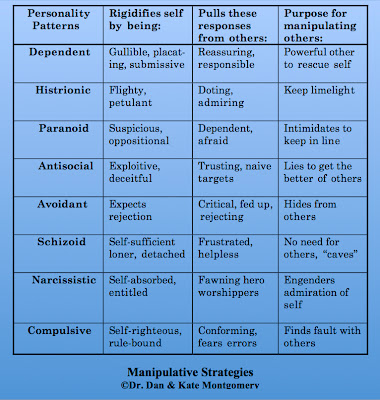Pioneers in humanistic personality theory include
Abraham Maslow, Carl Rogers, and Fritz Perls. The uniqueness of humanistic
theory lies in its benevolent view of human nature with an emphasis on the
positive potential for self-actualizing development that lies within every
person.
What is the essence in the life work of these three
theorists? A perspective that plays down the unconscious factors in behavior
and builds up the self-actualizing tendency of the human organism, suggesting, as
Maslow does, that when basic needs such as food and shelter are met, higher
order needs such as belonging and a quest for meaning emerge.
 |
| Hierarchy of Needs |
Humanistic psychology is strong on validating people
and not inclined to categorize behavior so as to judge right from wrong or good
from evil. The reason why some people are cruel, harmful, or exploitive of
others lies in their earlier development, because they were not treated with
appropriate respect and trust when growing up. The remedy lies in providing
educational or therapeutic influences that offer unconditional positive regard
and the prizing of one’s personhood. Once people internalize this empathetic
form of relating, they are likely to radiate this response to others,
increasing the quality and intimacy of their social relationships. As Carl Rogers
said, “The basic nature of the human being, when functioning freely, is
constructive and trustworthy.”
Compass personality theory agrees that human beings
are endowed with potential for noble and praiseworthy behavior, adding that
Christ expresses this human ethic in the Golden Rule: “So in everything, do to
others what you would have them do to you, for this sums up the Law and the
Prophets” (Mt 7:12).
Yet as the Bible shows and human behavior empirically
validates, there exists a profound capacity within human nature and personality
to resist, corrupt, and even destroy the possibility for positive outcomes in
self and others.
Compass theory calls this mystery of iniquity by the biblical
name of sin, a problem in which human beings manipulate the self and others
through personality patterns. These patterns create rigidities present in every
person to some degree. Jean Paul Sartre writes of these rigidities that “all
human beings are guilty in principle, of self-deception, of inauthenticity, of
playing a role or trying to disguise one’s actual personality behind a façade.”
 |
| Manipulative Strategies |
Maslow, too, noted, “We must also face squarely the
problem of what stands in the way of growth: that is to say, the problems of
cessation of growth and evasion of growth, of fixation, regression, and
defensiveness, in a word, the attractiveness of psychopathology, or as other
people would prefer to say, “the problem of evil.”
When it comes to human growth, Maslow, Rogers, and
Perls see self-trust as fundamental to making authentic choices that foster congruence through listening to one’s
emotions, sorting out thoughts, and integrating thinking and feeling with an
awareness of bodily states. All three theorists believe that religious attitudes
can contribute to the process of healthy living:
- Maslow offers a Taoist orientation to reality, a non-invasive, non-interfering way of listening to one’s own needs and relating to others.
- Rogers is sympathetic to the teachings of Lao-Tse, believing that this way of being promotes “agape love” in human encounters by encouraging non-possessive openness and respect for individual differences.
- Perls, though at times distinctly anti-religious, nevertheless asserts that Zen Buddhism provides a laudable orientation to living in the here and now, free from the burden of demands and expectations.
By the same token, all three theorists espouse a
humanistic personality theory precisely because they believe that the highest
form of authority lies in one’s own human experience.
Compass personality theory shares with humanistic
theory an emphasis on the importance of inner experiencing in becoming a
person. Jesus taught that “the kingdom of God is within you” (Lk 17:21),
indicating God’s intimate concern with a person’s thoughts and feelings,
sensation and perception, learning and memory, attitudes and worldview.
Christianity encourages an attitude of trust in the present and hope for the
future: “May the God of hope fill you with all joy and peace as you trust in
him, so that you may overflow with hope by the power of the Holy Spirit” (Rom
15:13).
Indeed, it is within a person’s inner perceptual
field that the Holy Spirit moves to create self-trust, self-love, and self-development,
versus fear of life or idolatrous subjugation to any external facet of
creation. From this inner phenomenological field, which compass theory terms
the spiritual core, Christ moves in cooperative dialogue with persons,
ever-guiding them toward expanding circles of caring involvement with people
and culture. Since God enjoys infinite contact with all creation, individuals
growing in Christ are called to develop tenderness toward existence that
reflects God’s connectedness to all that is.
This outreach requires a rhythmic reliance upon the
structure provided by the Word of God, orthodox creeds and doctrine,
sacraments, and the Lord himself, offering a higher authority than an
individual’s private perceptual field alone, a rhythm that benefits from
developing an interpersonal selfhood in Christ. Within this context, trusting
Christ for inner and outer guidance makes one’s personality and human nature
relatively trustworthy, since Christ has redeemed human beings and calls them
to exercise autonomy in creative dialogue with the Trinity.


No comments:
Post a Comment
Note: Only a member of this blog may post a comment.